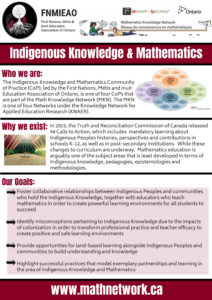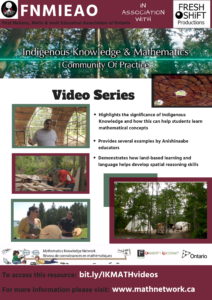View this update as a PDF here.
It was a busy summer for the MKN and our CoPs! See updates from our CoPs, learn about upcoming events, and find out how you can get involved below.
COMPUTATIONAL THINKING IN MATHEMATICS EDUCATION (mathnetwork.ca/ct)
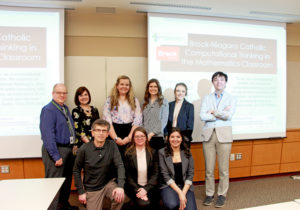 Over the past year, Brock University students worked collaboratively with Niagara Catholic District School Board teachers to develop engaging, coding-based activities for students that were explicitly or implicitly about mathematics. The team developed 4 CT-based Math Task Summaries, which are now available at mathnetwork.ca/brock-u-ncdsb-ct-math-tasks.
Over the past year, Brock University students worked collaboratively with Niagara Catholic District School Board teachers to develop engaging, coding-based activities for students that were explicitly or implicitly about mathematics. The team developed 4 CT-based Math Task Summaries, which are now available at mathnetwork.ca/brock-u-ncdsb-ct-math-tasks.
In October 2018 Erin Clements (McMaster University) wrote a report that asks the question: How does computational thinking affect students’ understanding of tertiary mathematics? The report explores this by showing how coding was integrated into an applied calculus course.
On November 24, 2018 the Fields MathEd Forum will be focused on Computational Thinking in Mathematics Education. More information will be available on their event page soon.
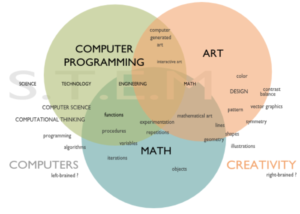 In September 2018 the CT CoP created a new resource on Math + Art + Code to help us to see math, art, and coding, individually and in combination, in a different way. This page includes web links for math + code + art, as well as annotated bibliographies on math + story/poem, math + dance/music, and math + arts theory. Please check out these new resources at mathnetwork.ca/math-art-code.
In September 2018 the CT CoP created a new resource on Math + Art + Code to help us to see math, art, and coding, individually and in combination, in a different way. This page includes web links for math + code + art, as well as annotated bibliographies on math + story/poem, math + dance/music, and math + arts theory. Please check out these new resources at mathnetwork.ca/math-art-code.
INDIGENOUS KNOWLEDGE & MATHEMATICS EDUCATION (mathnework.ca/indigenousknowledge)
Looking for a general overview of the IK CoP? Check out their new overview flyer below! In September 2018, the IK CoP released a series of videos that highlight the significance of Indigenous Knowledge in mathematics, provide several examples of Anishinaabe educators, and demonstrate how land-based learning and language help develop spatial reasoning skills. Please share the flyer below widely, and watch the videos at bit.ly/IKMATHvideos.
This year, the IK CoP will continue to focus on building relationships and creating partnerships between schools, community members, and post-secondary institutions. Other focuses of the year include establishing protocols for engaging with First Nations communities, exploring IK Math & Astronomy, and compiling IK Math resources on the MKN website.
CRITICAL TRANSITIONS IN STUDENT MATHEMATICAL DEVELOPMENT (mathnetwork.ca/transitions)
Early Years
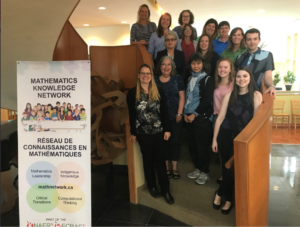 In August, the Early Years team met at the Fields Institute to discuss plans for 2018-2019. They look forward to continuing their work with the Greater Essex County DSB and are excited about their new partnerships with the Kawartha Pine Ridge DSB and London Catholic DSB.
In August, the Early Years team met at the Fields Institute to discuss plans for 2018-2019. They look forward to continuing their work with the Greater Essex County DSB and are excited about their new partnerships with the Kawartha Pine Ridge DSB and London Catholic DSB.
In the Spring of 2017, an educational needs assessment of early math education in Ontario was conducted using an online survey of 130 ECEs, Kindergarten teachers, and Grade 1 teachers. A summary of the results is now available in the infographic, Early Childhood Educators’ and Teachers’ Early Math Education Knowledge, Beliefs, and Pedagogy. Stay tuned for the full paper, available December 2018 in the Canadian Journal of Education.
Grade 8-9 Transition
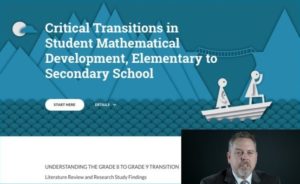 Dr. Daniel Jarvis has been developing an online resource entitled Crossing the Divide: Critical Transitions in Student Mathematical Development (Grade 8 To 9) and which features introductory videos (English/French), downloadable infographics, and links to other key resources. The new online resource was launched in September 2018 and can now be explored at the following link: mkncrossingthedivide.ca.
Dr. Daniel Jarvis has been developing an online resource entitled Crossing the Divide: Critical Transitions in Student Mathematical Development (Grade 8 To 9) and which features introductory videos (English/French), downloadable infographics, and links to other key resources. The new online resource was launched in September 2018 and can now be explored at the following link: mkncrossingthedivide.ca.
Locally Developed Grade 9 Classrooms
In June, the team working in locally developed Grade 9 classrooms shared their new Technical Report and Executive Summary on Revisioning the “Three R’s” from the Ground Up: Relationships, Resilience, and Resources. This year, the team will continue their work in Locally Developed Grade 9 classrooms in Lakehead Public Schools field-testing new resources.
One example of a field-tested unit involves the mathematics – and construction – of birch bark baskets. Cultural leaders from Lakehead Public Schools and Old Fort William were invited to facilitate the initial implementation of this set of lessons, and revised exemplar lessons are being written. Here are some of the students’ “in progress” baskets during the initial field test:
High School to University Transition
Many new units were developed this year and the teacher manuals and student workbooks were tested, and updated, with more updates still to come. There is now a total of 21 modules spanning grade 9 to 12. Visit the Math9-12 website to access these resources, and try them out in your classroom!
It has been evident that teachers need more guidance on how these resources can be integrated into a coherent well-supported curriculum. With this in mind, development has begun on a Grade 12 calculus and vectors textbook. A teacher workshop for this is being planned for August 2019.
MATHEMATICS LEADERSHIP (mathnetwork.ca/math-leadership)
During the summer, the Greater Essex County District School Board had extensive plans for professional development. Workshops targeted topics such as using concrete materials and technology in mathematics instruction:
- The Making Math Concrete workshop (July 24th & 25th), was designed to help Grade 1–4 teachers understand how to use the materials in teachers’ mathematics kits, possible innovations, and how to explore concepts concretely and visually.
- Grade 1–4 teachers also attended a workshop, Math Has Never Been So Much Fun! (August 7th and 8th), in which they experienced the transformation that occurs when iPads are used in purposeful and authentic ways.
- On August 7th, Grade 3–10 teachers explored how to gamify the formative assessment using Knowledgehook’s interactive web-based instructional guidance system.
- The Progression of Fractions workshop (August 8th), helped Grade K–8 teachers to make connections from relational thinking to proportional reasoning and represent these number relationships as fractions.
- On August 8th and 9th, the 21st Century Mathematician workshop for all teachers helped them look at ways the learning environment can be structured to support student development of 21st century competencies, how technology can be leveraged to promote communication and conceptual understanding, and how mathematics that connects outside the classroom can fuel student engagement in mathematics.
- Creating Interactive Math Lessons with Desmos, Online Graphing Calculator and Activity Builder, the August 9th workshop for Grade 7–12 teachers, introduced Desmos—a free online graphing calculator that makes graphing simple and complex functions easy and intuitive.
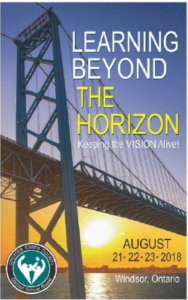 In continuation of the many debates, the August 14th workshop on Memorization vs. Automaticity: Back to Basics or Beyond the Basics? for Grade K–10 teachers, discussed ways to build a conceptual understanding of what multiplication means, how to visualize multiplication and how the standard algorithm for multiplication really works.
In continuation of the many debates, the August 14th workshop on Memorization vs. Automaticity: Back to Basics or Beyond the Basics? for Grade K–10 teachers, discussed ways to build a conceptual understanding of what multiplication means, how to visualize multiplication and how the standard algorithm for multiplication really works.- On August 14th and 15th, the Make Math Moments Matter workshop for Grade 4–10 teachers, discussed rich tasks that will spark curiosity and meet the needs of all learners regardless of their readiness.
- On August 21-23, the Board organized the conference titled, Learning Beyond the Horizon – Keeping the VISION Alive! In addition to the STEAM–Makerspace session for elementary school educators, the Leading School Mathematics beyond the Horizon, brought together Consultants, Administrators, Coaches, and Math Leads. This session was designed to support leaders of school mathematics of varying roles. The presenters from two of our MLLP schools introduced mathematics tasks that are specifically designed to support professional learning with staff and identified the elements of these learning experiences that build educator capacity.
- On August 22, Cathy Fosnot facilitated a whole-day session for elementary school educators on Landscapes of Learning: Understanding and Using Them in Powerful Ways. Dr. Fosnot provided examples of crafted sequences, videos of conferrals, and samples of student work for analysis using a learning trajectory for multiplication.
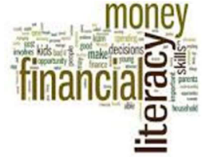 All GECDSB teachers were invited to attend the August 29th workshop on financial literacy. The workshop titled, Sound Investment: Financial Literacy Education in Ontario Schools, featured the free resources aligned with the Ontario Curriculum produced by the Canadian Foundation for Economic Education (CFEE).
All GECDSB teachers were invited to attend the August 29th workshop on financial literacy. The workshop titled, Sound Investment: Financial Literacy Education in Ontario Schools, featured the free resources aligned with the Ontario Curriculum produced by the Canadian Foundation for Economic Education (CFEE).- On August 29, Junior/Intermediate and ESL teachers, attended the workshop titled, Engaging our students Through Tools, Tasks, and Talk. The facilitators provided a closer look at pedagogical systems by exploring mathematics through the use of various open tasks and manipulatives, highlighting the importance of productive dialogue in our classes.
- The very last GECDSB workshop in the summer series introduced the Primary, Junior, and Intermediate teachers to teaching games for understanding (TGFU) ideas. The August 30th session was titled, Math Moves: Using TGfU Games to Teach Fundamental Movement Skills; Implementing DPA into Your Day. The facilitators explored movement education to make connections to the Mathematics curriculum.
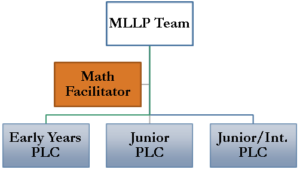 In August, the ML CoP brought four educators to the Visible Learning Institute in Toronto, which featured John Hattie and Jenni Donohoo, with John Almarode facilitating a whole-day session on Visible Learning for Math. This two-day institute in Toronto was introduced as the first step in creating Visible Learning Schools.
In August, the ML CoP brought four educators to the Visible Learning Institute in Toronto, which featured John Hattie and Jenni Donohoo, with John Almarode facilitating a whole-day session on Visible Learning for Math. This two-day institute in Toronto was introduced as the first step in creating Visible Learning Schools.
In September the ML CoP released a new report on the GECDSB’s Mathematics Leadership Learning Project (MLLP). This project supported Math Leadership Learning Teams in 6 schools to lead mathematics learning through Professional Learning Communities (PLCs). For further details, results, and implications for future learning, read the full report.
The regional leadership networks (e.g., MLN, ML2N, NWML2N, MLNTO,) will start a new round of face-to-face meetings in October.
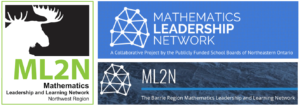
Get Involved!
Looking for upcoming learning and sharing opportunities? See our events page and check out our CoP resources. To stay up-to-date on our latest news, activities, and resources, explore mathnetwork.ca, join our mailing list, and follow us on Twitter @mknrcm. If you are interested in getting involved in the work of the MKN, please contact Melanie Langemeyer, MKN Coordinator (mlangeme@fields.utoronto.ca).

